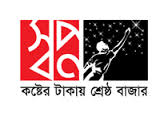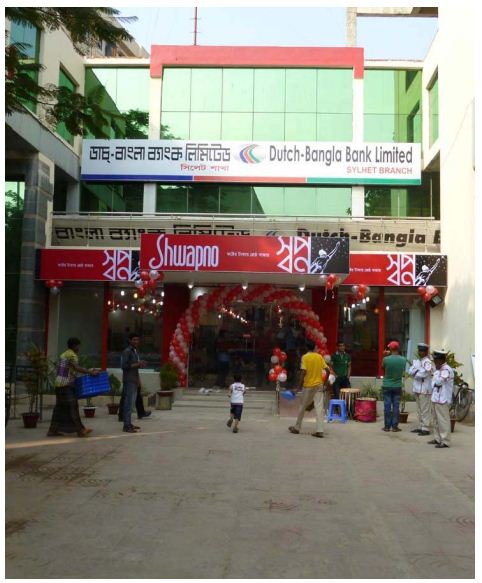Executive Summary
Shwapno is a part of ACI Logistics. The ultimate objective of Shwapno is to ensure access to a broader range of people of Bangladesh. It has a special focus to serve the different income group of the country by providing services that are convenient, affordable and reliable. This report mainly focuses on the retailer business as a whole and Shwapno place in this competitive industry. Through the report I have tried to do a comparison between Shwapno
and Agora and find out the competitive advantages of each of the company. In the end, I have suggested some recommendation that Shwapno can implement to maintain their competitive advantage be a market leader in the industry..
The report is containing a comparison between Shwapno and Agora in terms of their branding. There the comparison based on visibility level, area covered by the company and other branding issue. The report also portrays the industry through Porters’ Five forces model. The state of the industry is best portrayed through the model. The threat of new entrants is low due to the shortage in spectrum and bargaining power of suppliers is also low. If one studies the comparative analysis of the market, it can be seen that Shwapno has already built brand equity among its customer. Thus far, it has been able to hold on to its leadership without doing much.
Introduction:
Standing motionless, raising head to the open sky, staring aimlessly, having tears rolled inside the heart, expecting for customers, who will approach followed by purchasing the product, but returning home selling his merchandise at below the production cost most often leaving those merchandise unsold at the end of the day due to lack of buyer, a farmer from a typical Bazar in Bangladesh passes his everyday for his livelihood. There are millions of farmers scattered across Bangladesh have this sort of gruesome and untold experience in their life leading them to take different such unproductive occupation as pulling rickshaw, thus dragging our agro based economy to down and
making us more dependent on imported food. Ironically, most of us do not know that silent cry is going in the families of those hapless farmers. Most farmers spend their day in suspicion thinking whether they can sell their products at fair price as well as sell those all, even if they have bumper production in their field. Hardly do they get fair price and sell those altogether, ironically. What a great humiliation for farmers, who work all day long under scorching sun devoting his happiness and meet the daily vegetable and grain needs of urban people. Likewise, fisherman and meat producer encounter this type of fate in their life. Most of the farmers, fisherman and meat producer of our country are the victim of typical interest business “Dadan”, which exploit them instead of benefiting
them. Lots of vegetables decay in rural area because farmers do not find enough buyers who will buy their goods, whereas city dwellers pay extra to meet their vegetable need. Besides, poor transportation infrastructure and transportation system attribute to inefficient flow of agriculture goods from rural area to urban. While producers are on one extreme of value chain, consumers are on other extreme.
Shopping in untidy ambiance such as muddy floor, insufficient space to move, unhygienic arrangement of product, bargaining process, inconsistence price, a shopper in urban area lose his or her interest to shop in market and get panicked subsequently. Shopping in kitchen and supermarket is no longer a pleasant experience rather nightmare for shopper. As a result, home service is getting popularity among urban people. Customers in urban area are being deceived everyday by shopkeepers with selling inferior goods, charging excessive price and incorrect measurement. In other words, consumers are one sort of hostage to these shoppers, who form one kind of syndicate and dictate the market. The agony of the consumer compound with exorbitant price, inferior quality of the products, and long bargaining custom in Bangladesh, inaccurate measurement, traffic jam, and so forth triggered by lose of interest for shopping, whilst shopping is a pleasant experience in most of the countries.
Objective of the Project:
Objective of this report includes two types of objectives. They are broad objective and specific objectives. A broad objective and some specific objectives are included in this report. They are given below-
Broad Objective:
The main objective of this report is to find out the challenges and opportunities of Shwapno business.
Specific Objectives:
The specific objectives of this report are given below:
To describe the information gathered from practical experience of working in Marketing Department of Shwapno.
- To relate the practical knowledge with theoretical knowledge.
- To have a clear view of current scenario of Shwapno.
- To identify about the contribution of Shwapno in this sector.
- To find out what kind of major challenges Shwapno is facing and to identify their opportunities.
- To make a comparison about the challenges and opportunities with the competitor company Shwapno.
- To makesome suggestion regarding the issue.
Methodology:
Methodology describes the manner in which data is collected, analyzed and interpreted. The data that will present in this paper would collect from primary and secondary data source.
The sources are mentioned below:
Primary Data Source
In this report, the primary data source would be raw data gathering from own observation. The primary data source that will be used in this report is data obtained through practical involvement with job responsibilities.
Secondary Data Source
Secondary data includes reviewing articles and internet for the completion of the organizational part. To give the report a better look, secondary data is also collected from different brochures, newspapers and consultation and some interview sessions.
Company Overview
Standing motionless, raising head to the open sky, staring aimlessly, having tears rolled inside the heart, expecting for customers, who will approach followed by purchasing the product, but returning home selling his merchandise at below the production cost most often leaving those merchandise unsold at the end of the day due to lack of buyer, a farmer from a typical Bazar in Bangladesh passes his every day for his livelihood. There are millions of farmers scattered across Bangladesh have this sort of gruesome and untold experience in their life leading them to take different such unproductive occupation as pulling rickshaw, thus dragging our agro based economy to down and
making us more dependent on imported food. Ironically, most of us do not know that silent cry is going in the families of those hapless farmers. Most farmers spend their day in suspicion thinking whether they can sell their products at fair price as well as sell those all, even if they have bumper production in their field. Hardly do they get fair price and sell those altogether, ironically. What a great humiliation for farmers, who work all day long under scorching sun devoting his happiness and meet the daily vegetable and grain needs of urban people. Likewise, fisherman and meat producer encounter this type of fate in their life. Most of the farmers, fisherman and meat producer of our country are the victim of typical interest business “Dadan”, which exploit them instead of benefiting
them. Lots of vegetables decay in rural area because farmers do not find enough buyers who will buy their goods, whereas city dwellers pay extra to meet their vegetable need. Besides, poor transportation infrastructure and transportation system attribute to inefficient flow of agriculture goods from rural area to urban. While producers are on one extreme of value chain, consumers are on other extreme.
Shopping in untidy ambiance such as muddy floor, insufficient space to move, unhygienic arrangement of product, bargaining process, inconsistence price, a shopper in urban area lose his or her interest to shop in market and get panicked subsequently. Shopping in kitchen and supermarket is no longer a pleasant experience rather nightmare for shopper. As a result, home service is getting popularity among urban people. Customers in urban area are being deceived everyday by shopkeepers with selling inferior goods, charging excessive price and incorrect measurement. In other words, consumers are one sort of hostage to these shoppers, who form one kind of syndicate and dictate the market. The agony of the consumer compound with exorbitant price, inferior quality of the products, long bargaining custom in Bangladesh, inaccurate measurement, traffic jam, and so forth triggered by lose of interest for shopping, whilst shopping is a pleasant experience in most of the countries.
The above two parties of the value chain are the ultimate loser since intermediaries in this value chain process reap the major benefit by exploiting both producer and consumer in terms of paying price below the production cost to the producer and charging premium price to the customers. Wholesaler and retailer are two intermediaries in this value chain, where wholesaler often form cartel to manipulate the market by creating crisis in the moment of high demand or low production, while retailer charge customer with high price, sell inferior quality, practice inappropriate measurement, and so forth. Neither producers nor consumers get the benefit of the value chain.
Only do the wholesaler and retailer capitalize on the weak bargaining power of the producer and absence of proper monitoring on market price, quality assurance by government on the part of consumer. We have not seen any significant progress in preserving consumers’ rights in Bangladesh, even if government took several measures, such as campaign against contamination, enacting new laws concerning consumers’ rights, and so on.
Today farmers, who are invariably deprived of having minimal scale of social rights to make the livelihood through farming, are the most unfortunate community in Bangladesh despite serving the nation with supplying basic need-food. In addition, hardly do they get any assistance from government in terms of supplying fertilizer, diesel oil, seeds, cultivation equipments at rational price, whereas farmers in developed and developing countries are the most respected community, who can avail subsidies from government, quality seeds, fertilizer and diesel oil at cheap price. This ironic situation of our farmers is leading them to embrace some unproductive professions most often
some anti-social activities, thereby impacting economy negatively dragging the country to more reliance on foreign aid. Advanced Chemical Industries (ACI) Ltd, former ICI PlcUk, began its journey in 1992 with the mission
of enriching the quality of life through responsible application of knowledge, skills and technology, and has successfully established itself as one of the biggest conglomerates in Bangladesh. ACI, having a multinational heritage, is committed to the pursuit of excellence through world-class products, innovative processes and empowered employees, to provide the highest level of satisfaction to its customers. ACI began its journey to ensure better life to the Bangladeshi people with the name of ICI (Imperial Chemical Industries) in 1968 in Bangladesh by offering a wide range of such products as pharmaceutical, Consumer product, and so forth. However, ICI divested into ACI (Advanced Chemical Industries) by selling its share to local management, and named by ACI in 1992.
By far, the life saving drugs and home care products have met the need from the people to some 5 extent as the persistent existence and acceptance from local community since 1968 has proven and acknowledged its endeavor and uncompromising quality. Home care products encompass ACI Aerosol, ACI Mosquito Coil, Angelic Air Freshener, Savlon Liquid Antiseptic, Savlon Antiseptic Cream, Savlon Liquid Soap, and so on. ACI has been realizing certain areas, which need to be improved in order to ensure better life standard in Bangladesh for couple of years. It follows that, ACI started thinking to invest in those potential as well as demanding areas. As a consequence, we have been experiencing new inclusion to ACI family such as flour, spice powder, salt, electronics, and so forth. All endeavors, deemed by ACI, undertaken so far are for enriching the quality of life of Bangladeshi people.
However, a large portion population especially farmer and end user has been deprived of having such benefit, even though market is flooded with a wide range of products since the producers do not get appropriate price for their production and consumers invariably are deceived by sellers, who often sell inferior goods, goods with inaccurate measurement, and so on. Of late, most of the business firms form cartel, which has been worsening the condition of life of farmers as well as consumers, to dictate the market, and they are successful in this case. ACI has been looking for ways to finish this cartel off so as to benefit both farmers and consumers. Besides, most of the vegetable
produced in rural areas get rotten due to lack of proper transport facilities, whereas city dwellers have to pay extra money for scarce vegetable in the city. Countries, like Bangladesh, where economy is based on agriculture altogether, are required to emphasize more on agribusiness and supply chain development since these countries lack sufficient
technology to move to industry, which requires natural resources as well as extensive technological knowhow. Every country has comparative advantage on some area, and so does Bangladesh. Comparative advantage of Bangladesh is supposed to be agriculture. By contrast, Bangladesh is blessed with both natural and human resources. By far, the primary contributors to the exchequer are remittance and garments sectors, where millions of people are working relentlessly to ensure sustainable economic growth. Even if Bangladesh has experienced a surged in some such industries as garments, textile, and small cottage, it cannot deny the role of agriculture to the economy as it
has to import a lot of food every year to meet the local demand, while there are lots of potentiality to grow foods if lands are properly used and modern technology is adopted in agriculture.
Understanding the gap in the value chain, ACI has initiated to establish new businesses namely ACI Agribusiness and ACI Logistics to remove this gap, to uproot cartel, and to ensure reasonable price for both farmers and consumers. ACI Agribusiness has been working to bring revolution to the agriculture by investing such areas as Seeds, Fertilizer, Motor, Crop care & Public Health, and Animal Health, whilst ACI Logistics has been established to devote itself to benefit the end users of all products.
Quality Policy
ACI’s mission is to achieve business excellence through quality by understanding, accepting, meeting and exceeding customer expectations. ACI follows International Standards on Quality Management System to ensure consistent quality of products and services to achieve customer satisfaction. ACI also meets all national regulatory requirements relating to its current businesses and ensures that current good Manufacturing Practices (GMP) as recommended by World Health Organization is followed for its pharmaceutical operations. The management of ACI commits itself to quality as the prime consideration in all its 7 business decisions. All employees of ACI must follow documented procedures to ensure compliance with quality standards. The pool of human resources of the company will be
developed to their full potential and harnessed through regular training and their participation in seeking continuous improvement of work methods.
Environmental Policy
ACI is committed to maintain the harmonious balance of our eco-system and therefore constantly seeks ways to manufacture and produce products in an eco-friendly manner so that the balance of nature remains undisturbed and the environment remains sustainable.
- In pursuit of this goal, ACI will comply fully with all local and national environmental regulations.
- Conserve natural resources like water and energy for sustainable development, and adopt environmentally safe processes.
- Ensure appropriate treatment of all effluents prior to discharge, to prevent pollution or degradation of environment.
- Ensure appropriate communication and cooperate with internal and external interested parties on environmental issues.
- Create awareness on environmental issues among employees and suppliers.
- Adopt modern waste management technology.
Global Compact Endorsement
The ACI group has consistently demonstrated its commitment towards its employees and the environment over the years. It has been recognized as the practitioner and promoter of socially responsible business behavior. To take this commitment even further, ACI has endorsed the Principles of Global Compact on August 18, 2003. The Global Compact is a remarkable initiative sponsored by the United Nations Secretary General Koffi Annan. It is based on a very simple notion: whether or not required by law, corporations should enforce basic human rights and accepted labor and environmental standards in all their business activities, to counterbalance possible negative effects of globalization. The compact calls on companies to embrace the ten universal principles in the key areas of human rights, labor standards and the environment. These ten principles are:
Human Rights
To support and respect International Human Rights within the company’s sphere of influence.
To make sure that their own corporations are not complicit with Human Rights Violation.
Labor
To end discrimination in the workplace. Abolition of child labor. The right to collective bargaining and recognition of freedom of association. To eliminate the use of forced and compulsory labor.
Environment
To support a precautionary approach to environmental challenges. To undertake initiative to promote greater environmental responsibility. To encourage the diffusion of environmentally friendly technology.
Anti-Corruption
To work against all forms of corruption, including extortion and bribery. ACI pledges to keep all its employees, customers, shareholders and suppliers regularly informed about the compact and the company’s initiatives to uphold the principles.
Activities of the organization
ACI Limited is committed to providing customers with a broad range of quality products from its business operations. It has diversified its business in various sectors such as the health care division, consumers’ brands division, and agribusiness division. Other than its major strategic business units, it has 11 subsidiaries, 3 joint ventures and associate.
Agribusiness
ACI Agribusiness is the largest integrator in agricultural sector of Bangladesh. ACI Agribusiness deals with livestock and fisheries, crop protections, seeds, fertilizer and agrimachineries. Under Agribusiness, the following business units are currently operating:
Crop Care & Public Health
Crop care & Public health is dealing with all type of crop protection items. It is providing a complete range of cost effective products which can provide appropriate solutions for the farmers through insecticides, herbicides, and fungicides. This business has been transferred to ACI Formulations Limited form 1st January of this year. ACI Formulation Limited has been listed to Dhaka Stock Exchange and Chittagong Stock Exchange recently.
Seeds
Seeds division is dealing with hybrid rice, vegetable and maize seeds. It has partnership with renowned HYV seed companies of the world. ACI started the seed business in 2006. It has its own research and development stations in Gazipur and Bangladesh Agricultural University, Mymensingh.
Cropex
Cropex is dealing with commodity buying, storing, preserving and selling. ACI Cropex is a remarkable addition to the agricultural advancement in the country. The project assists the farmers in various ways – exchanging their crops at the time of their necessity, providing them with technological assistance and advisory services and so on.10
My Learnings:
Being able to work for one of the leading Group of company of the country is always enticing. However, that is only part of the whole story. The working environment of ACI Logistics is one of the best not only in the Outlet business but all over Bangladesh. The office space is open and everyone can move around and communicate with others freely. All the employees are very much friendly. The communication system is very much open ended such as anyone can give suggestion if they find anything wrong. For an example Outdoor branding team give suggestion to sales team if they find any think wrong.
Comparative Analysis
Outlet
Compare to other organization that is involve with super shop business like Agora, Meena Bazar Shwapno is in first position in every aspect. Shwapno has 47 outlets all over 17 Bangladesh, and day by day the no. of outlets is increasing. Market share of Shwapno is 35% in modern retail system. The biggest advantage of Shwapno is that, different age and different income group people is the target people of Shwapno that is the main uniqueness as Shwapno.
Decoration:
Decorations of Shwapno outlets are different than any other super store. Shwapno always try to decorate their outlet in a different way to attract the customers then their competitors. Like they decorate their new outlet with balloons and much colorful material.
Prices:
Compare to other supershop price of the products in Shwapno is less. The main reason is that Shwapno usually collect their products directly from whole seller, and another important reason is VAT .Shwapno usually pays the government VAT themselves for that reason they take less price from the customers. Low price than regular market is the most competitive advantage for Shwapno.
Advertisement:
Promotional activity of Shapno is totally different from competitors. From the above picture we can see a unique promotional concept which is recently made by Shwapno. Shwapno always tries to connect with their customers with different occasion. So they always make different advertisement based on different occasion. From their unique advertisement it is highly noticeable.
Observation:
Vacancy of Employment for Months:
There was a vacancy of employment for months which creates less effective completion of work. In sales dept., after resigning of an employee in the position of sales coordinator, the dept. did not involve in recruitment process. Absence of an expert as well as well-trained employee such him, the work process became slower.
- Fewer Corporate Visits: Sales officers do not visit corporate offices properly. Their fewer visits become a hindrance to get potential clients.
- Slow Execution of Decision: The implementation and complication of decision is very lengthy. If a decision is made, then for the approval it has to be singed by the managers of all department which is a very time
consuming process because all the managers are not present in the office at a time and sometimes it take days to get signatures from all the managers.
Recommendation
- Faster Work Execution: To get proper success in any particular work, faster work execution is needed to a great
extent. If the execution gets faster then it will be very profitable for the company. - More Potential Corporate Visit: Sales officer should visit more corporate offices to get the potential clients.
- Increase Response in E-mail: To expect the work to be done in time and share information among all the employees, quick response towards the mail has to be increased and all the personnel should open the mail link
the whole day and has to go through them often. - Following of Company‟s Written Policy: All the decision should be made based on the company policy. If that is done and problem occurs in the future then we can always depend on the company policy.
- Responsiveness: If the employees find themselves more serious and focused towards work then it will be more
profitable for them as well as for the organization. - Update Software: If the software is updated, the work can be completed in a faster way. 23
- More Marketing: The company‟s name has been changed few months ago, so it is important to do proper
marketing. Immediately the company should create a new logo of the company. - Filling up Recent Vacancy: The sales dept. should go for recruitment process for the vacancy position in order to make work effective.




















